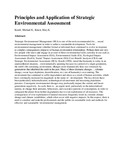| dc.description.abstract | 'StrategiC Environmental Management (SEA) is one of the tools recommended for , . sound environmental management in order to achieve sustainable development. Tools for environmental management (whether formal or informal) have continued to evolve in response to complex consequences (impacts) of human-environment
relationships. Perhaps there are very few people who know and engage in several of these environmental tools currently in use such as Environmental Impact Assessment (EIA), Environmental Audit (EA), Ecological Impact Assessment (EcoIA), Social
!'Impact Assessment (SIA) Cost-Benefit Analysis (CBA) and Strategic Environmental Assessment (SEA).
Koech (1998), noted that humanity is today in an unprecedented situation, . environmentally speaking because in a period of a single generation, the earth's life sustaining environment, changes more dramatically than was witnessed by generations that inhabited the earth in the past. Many of these dramatic changes .
. (climate change, ozone layer depletion, desertification, etc.) are of humanity's own making. The environment has continued to suffer degradation and abuse as a result of human activities, which have continually increased in magnitude in the name of . development. The key drivers have been particularly industrialization, technological advancement and increasing population pressure. Consequent environmental changes may profoundly impact the current and future generations negatively.
As such, there is . an urgent need, particularly in the industrialized nations, to change their attitudes, behaviours, and excessive patterns of consumption, in order to safeguard the planet from further degradation due to over exploitation of all resources. The consequences of over exploitation of natural resources frequently result in, extreme climate change and climate variabilities, which often occur with negative impacts. In this respect, there is need to sensitise and train the professionals and the public on sustainable tools and methods for effective and sustainable 'environmental management. | en |

